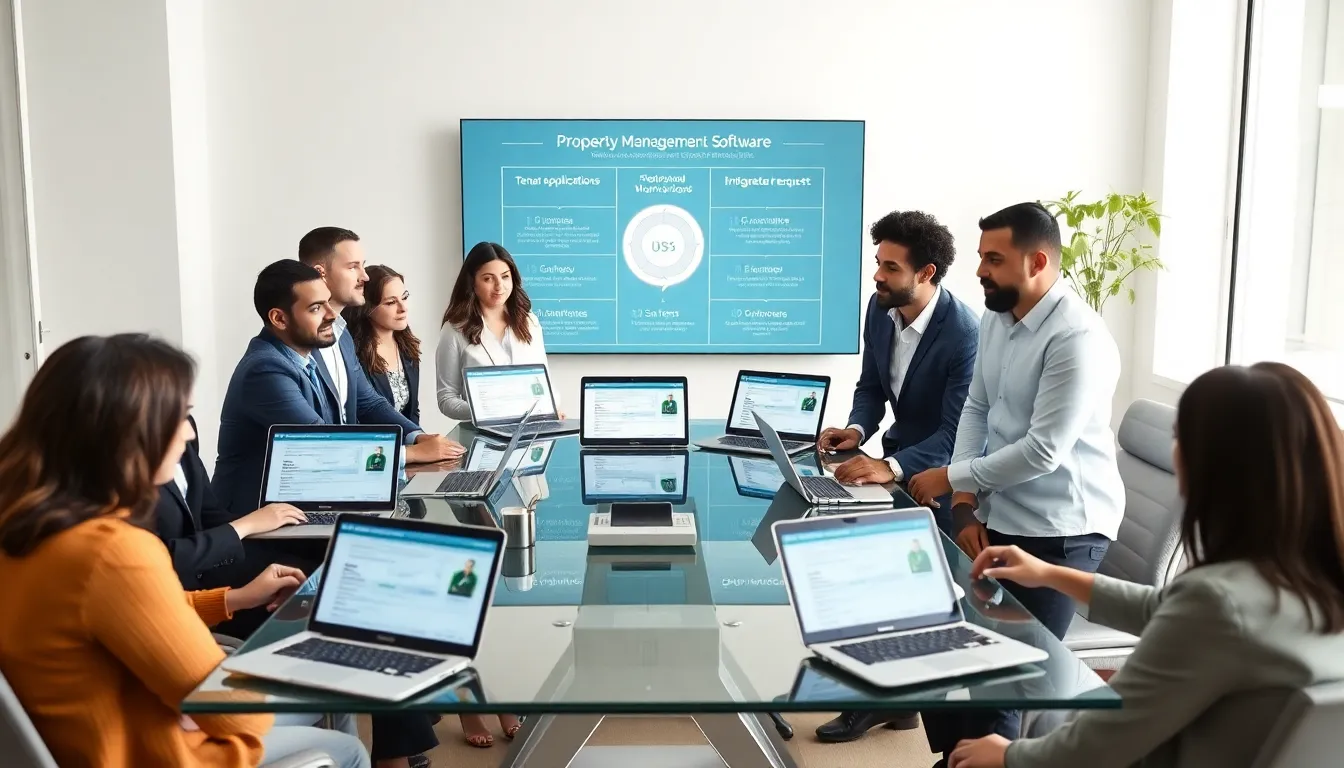In today’s fast-paced world, the property management realm is undergoing a seismic transformation courtesy of technology. Imagine managing buildings with the same ease as ordering pizza. No more tedious paperwork or endless spreadsheets, property management tech is here to save the day while making property managers feel like superheroes in crisp suits. Let’s explore how this tech is reshaping the landscape and why it’s essential for thriving in real estate today.
Table of Contents
ToggleUnderstanding Property Management Technology

Property management technology refers to a suite of tools designed to streamline various tasks associated with managing real estate properties. From tenant applications to maintenance requests, these technologies integrate functions that previously took hours into a simple click on a smartphone or computer. The core principle behind these technologies is efficiency. They enhance communication among property managers, tenants, and service providers, optimizing workflows and minimizing human error.
Traditionally, managing a property required extensive manual effort, involving stacks of paperwork and mayhem of phone calls. But now, with the advent of property management software, everything from lease agreements to maintenance logs can be done electronically. This shift not only saves time but also stretches budgets further, making it a valuable asset in today’s competitive market.
The Benefits of Implementing Property Management Tech
The upsides of incorporating property management tech cannot be overstated. First and foremost, it enhances operational efficiency. Tasks that once consumed hours can now take mere minutes. For instance, rent collection, maintenance scheduling, and even tenant communication can be automated. This not only frees up precious time for property managers but also reduces the risk of errors.
Secondly, tenant satisfaction sees a significant boost. Many tech solutions offer tenant portals where individuals can submit maintenance requests, pay rent, and communicate with management seamlessly. Happy tenants are less likely to move out, which equates to lower vacancy rates. Also, these tools provide valuable insights through data analytics, helping property managers make informed decisions.
Finally, implementing technology improves compliance with regulations. Since many jurisdictions require specific documentation and transparency, having tech solutions ensures that managers maintain records effectively, minimizing legal risks.
Key Features of Effective Property Management Software
When evaluating property management software, certain features stand out as essential.
- Tenant and Lease Tracking: The ability to monitor tenant information and manage lease agreements is crucial. Effective software allows property managers to view expiration dates, track lease renewals, and store tenant histories.
- Automated Rent Collection: Setting up online rent payment options simplifies the collection process and encourages timely payments. A good system enables reminders for late payments automatically, resulting in improved cash flow.
- Maintenance Management: Automated maintenance requests empower tenants to report issues directly through an app, which means managers receive notifications in real time. This not only speeds up response times but also tracks maintenance histories for each unit.
- Communication Tools: Good property management software includes built-in messaging features, allowing seamless communication between tenants and managers.
- Reporting and Analytics: Effective reporting tools allow property managers to generate insights into occupancy rates, income, and expenses. This eventually aids in decision-making and planning.
Popular Property Management Tools and Platforms
A plethora of property management tools exists, each bringing unique features to the table. Some popular platforms include:
- AppFolio: This software shines with user-friendly interfaces and robust features, including online payments and maintenance tracking.
- Buildium: Buildium offers comprehensive tenant management functionality, focusing on ease of use for both managers and tenants.
- TenantCloud: A versatile tool for residential as well as commercial property management, TenantCloud integrates accounting, marketing, and tenant management into one platform.
- Rentec Direct: Known for its advanced reporting capabilities and tenant screening, Rentec Direct is ideal for property managers looking for depth in analytics.
- Propertyware: Perfect for larger portfolios, Propertyware provides advanced features tailored for scalability and comprehensive property performance analysis.
How to Choose the Right Property Management Technology
Choosing the right property management technology can feel overwhelming given the options available. Here are several key factors to consider:
- Assess Your Needs: Begin by understanding your current challenges and needs. Are you struggling with tenant communication? Focus on platforms with robust communication tools.
- Scalability: Opt for software that can grow with your portfolio. Whether you manage a small building or several properties, your technology should easily accommodate expansion.
- User Experience: The interface should be intuitive for both property managers and tenants. Pay attention to customer reviews about usability.
- Integration Capabilities: Ensure the software integrates well with other tools you use, such as accounting software or marketing platforms. This streamlines operations and avoids data silos.
- Budget Considerations: Finally, consider your budget. Some platforms offer different pricing tiers based on features, while others may have hidden costs. Opt for a solution that provides value without very costly.
Future Trends in Property Management Tech
As technology advances, property management will continue evolving. Here are a few trends to watch:
- Artificial Intelligence (AI): AI can automate repetitive tasks such as tenant queries and maintenance scheduling, streamlining operations further.
- Smart Home Technology: Incorporating smart devices into properties can attract tech-savvy tenants. Smart locks, thermostats, and appliances increase convenience and energy efficiency.
- Data Analytics: The push for data-driven decision-making will intensify, allowing property managers to leverage insights to forecast trends and optimize operations.
- Virtual Reality (VR): VR is starting to make strides in showing properties remotely, offering virtual walkthroughs that entice prospective tenants.
- Blockchain: This technology could revolutionize leases and transactions, making processes secure and transparent. This could significantly reduce fraud related to rental agreements.






